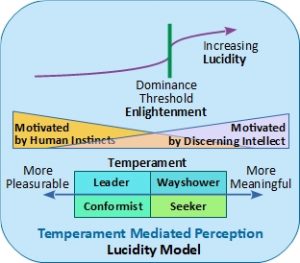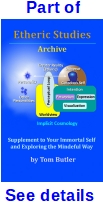
Seeking 101
 This essay is intended to explain the essence of our spiritual anatomy. The assumptions used here are based on current mainstream and parapsychological science and lessons learned from transcommunication (mediumship and instrumental).
This essay is intended to explain the essence of our spiritual anatomy. The assumptions used here are based on current mainstream and parapsychological science and lessons learned from transcommunication (mediumship and instrumental).
Who we are: A person is an immortal personality entangled with a human avatar during this lifetime. Progression is moderated by the combined influence of our human’s instincts and understanding with spiritual inclinations we inherit from our core intelligence in our worldview.
Immortal Personality: Our immortal personality is our core intelligence; our I am this aspect. You might call it Soul in the religious sense. Think of it as Observer.
Conscious Self: Our conscious self is like a roving video camera. It represents our immortal personality’s perspective. It is our I think I am this aspect. Think of it as Experiencer.
Mostly Unconscious Mind: Between Experiencer and Observer is Judge. It is the functional area of our life field that represents the process with which we generate perception and expression. It is through Judge that we develop a sense of what is real … but not necessarily actual.
Judge only tells us what we have been taught is true. For that reason, when it comes to personal progression, how effective we are as mediums and the kind of citizen we become, Judge is the most important part of our spiritual anatomy. For most people, it is the mostly unconscious source of perception and expression.
By consciously seeking to understand reality as it is, rather than as we are taught, we train Judge to suspend its coloring of sensed information and allow conscious self to more clearly experience actual reality.
Worldview: The worldview functional area represents the yardstick Judge uses to determine if sensed information is to be passed on to conscious self, and if so, how it might be colored. I will spare you the details about the supporting functional areas of mostly unconscious mind. That information is at ethericstudies.org or in the book, Your Immortal Self.
Intention: The only real control we have over Judge is the expression of intention. If you think of Worldview as the blueprint for your personal reality, you can see that it does not very easily change. We cannot just decide to be a different way. It takes the habitual expression of intention to be that new way. Worldview is where Judge keeps habitual memory.
Sensed Information (Perception): This is a tricky concept, so pay attention. Sensed information includes psi signals from all other life fields. Judge filters out all but what is important to us.
Our human’s body sends sensed information from its five senses to Judge which is conditioned to translate that information into signals we consciously experience as physical.
When we intend to express ourselves, that intention goes to Judge which decides what we will express. In turn, we experience what we express as sensed information. This may be a command for our body to move; perhaps speak. It may be a mind-to-mind expression to another personality.
Perception, then, is incoming information which we have been conditioned to experience as psychic, physical or thought.
Remember that it is our human we seek to heal and not our spiritual self.
Expression: Perception comes to our conscious awareness (Experiencer) as an expression from Judge. When we intend to express a thought to someone, it is also colored by Judge.
Lucidity: As we gain in spiritual maturity, we also gain a small degree of conscious control of Judge. The effect is conscious influence of Worldview, and therefore, how Judge colors our perception and expression. While we seek spiritual maturity through such practices as meditation and dream control, we are actually conditioning Worldview so that Judge will show us reality as it is. The effect is that we better align our personal reality with actual reality. (Principle 3 and 7 of the Declaration of Principles)
“The One Thing” is to seek spiritual maturity. In a recent essay on ethericstudies.org titled “Humanism and Discerning Intellect,” I explored the idea that our human’s instincts and discerning intellect inherited from our immortal personality act as motivators governing our every action.
Human Instincts: We are not our body. Our body is our avatar enabling us to experience a lifetime in the human condition. Our human has evolved instincts which govern its existence. Without conscious intervention from our immortal personality, which is represented by our conscious self, our human would be little more than other animals.
Our human’s instincts turn us toward behavior that best assures continuation of its gene pool, sometimes at the expense of other humans. As an example, a cooperate executive that puts capitalism above humanitarianism is arguably motivated by unhindered human instincts.
Discerning Intellect: Observation of people we consider spiritually mature shows that they favor community over individual gain. Participating in a cooperative community is one of the most important ways of learning to align personal reality with actual reality.
To know how to follow the Mindful Way, we need to know what causes a person to realize the need to consciously manage human instincts. Based on my study, it appears to have something to do with temperament.
Temperament: Just as people are born left or right-handed, people are born with basic personality traits that influences their behavior throughout life. The following traits provide a useful way to think of behavior:
Leader: Seeks to dominate socially and in business; tend toward pleasurable.
Conformist: Finds protection in numbers; tend toward pleasurable.
Seeker: Responds to the urge to better understand personal nature; tend toward meaningful.
Wayshower: Understands the need for collective progression; tend toward meaningful.
People can be described as a primary and secondary trait such as Leader-Seeker.
Pleasurable: It is more pleasurable to do things that promote survival of the gene pool. Human instincts turn us toward behavior that promotes our stature in the community. All of us desire to find significance in our life. That is a response to human instincts. The same can be said for unbridled capitalism; some has value, but without balance, success is at the cost of the greater good.
Meaningful: This is a term used in the Katha Upanishad. Perhaps a more useful term is cooperative. A community is just a group of people working together to conduct the business of living. As I use the term, a cooperative community is one in which people are able to work together to further each person’s spiritual progression. Kindness to one another is fine, but it is cooperative if it turns us toward personal growth.
The Temperament Mediated Perception Diagram at the top of this page illustrates the intended takeaway of this essay. I originally drew it to clarify in my mind why some people are more humane than others. The Mindful Way I have been developing is basically outlined in this essay.
Realizing the need to consciously manage our human’s instincts is the most important thing we can do to further our personal progression. To do that, it is necessary to understand the implications of how Judge colors sensed information before presenting it to our conscious awareness. We need to understand the implications of how Judge colors perception on our understanding about the phenomena of spiritualism.
![]()
